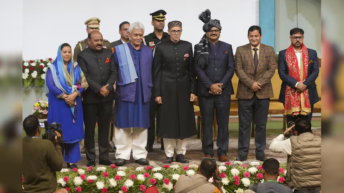|
Listen to article
Getting your Trinity Audio player ready...
|

The opponents of Mr. Narendra Modi often speak about an “undeclared Emergency” prevailing in the country ever since he became Prime Minister. For those who lived through the horrors of the Emergency imposed by Indira Gandhi for 21 months from June 25, 1975 and fought against it, any comparison of the present situation in the country with what happened then, would be downright odious and insulting. It would also amount to belittling the huge sacrifices made by lakhs of men and women, who stood up to Indira Gandhi’s dictatorship and fought bravely to restore the constitution and our democratic way of life.
It was indeed the ‘Second Freedom Struggle’ as many have called it, because if Indira Gandhi had been allowed to get away with it, India could have suffered permanent democratic derailment.
While there are hundreds of incidents which establish the dark shades of Indira Gandhi’s dictatorship, one incident which happened in the Supreme Court, convinced everyone that it was not just an authoritarian government but a fascist regime that ruled India at that time.
This is about an important case, known popularly as the Habeas Corpus Case, which came before the Supreme Court at the height of the Emergency in 1976. Known in court parlance as ADM, Jabalpur vs Shiv Kant Shukla, the case was heard by a five-judge bench comprising Chief Justice A.N.Ray and Justices H.R.Khanna, H.M.Beg, Y.V.Chandrachud and P.N.Bhagwati.
Following the proclamation of Emergency, the President, on the directions of the government, passed another order on June 27 suspending the operation of certain fundamental rights enshrined in Part III of the Constitution, including Article 14 (equality before law) and Article 21, which guarantees the right to life and personal liberty.
Those detained under the dreaded Maintenance of Internal Security Act (MISA) contended that the June 27 order was ultra vires the constitution; that it should be struck down; and the court should admit writs of habeas corpus moved by them.
During the hearing Niren De, the Attorney-General contended that so long as the Emergency was in force, no citizen could knock on the doors of the court to seek enforcement of the right to life and personal liberty.
Any democrat would have been aghast to hear such an argument, but barring Justice Khanna, the other four judges heard the Attorney-General in silence. Recalling that situation in the court, Justice Khanna says in his autobiography – Neither Roses nor Thorns – that he found some of his colleagues, who used to be very vocal about human rights and civil liberties “sitting tongue-tied” and “their silence seemed rather ominous”. Their non-reaction to Niren De’s arguments seemed to indicate which way the majority was going in this case. However, Khanna decided to confront the Attorney General in order to be absolutely sure about the ramifications of the Presidential order and the view of the government. He therefore asked Niren De whether, in view of his submissions, there would be any remedy “if a police officer, because of personal enmity, killed another man?”. Justice Khanna recalls that the Attorney General’s answer was unequivocal. Niren De said consistent with his argument, “there would be no judicial remedy in such a case so long as the Emergency lasts”. De further said “It may shock your conscience, it shocks mine, but consistent with my submission, no proceedings can be taken in a court of law on that score”.
Eventually, it turned out that although it ‘shocked’ the conscience of the Attorney General, it did not stir the conscience of the majority on the bench. Chief Justice Ray and Justices Beg, Chandrachud and Bhagwati upheld the government’s right to suspend the right to life and personal liberty.
Among the judges, Justice Beg rubbed salt on the wounds of the detenus when he went on to praise the “maternal” attitude of Indira Gandhi’s government. He said “we understand that the care and concern bestowed by the state authorities upon the welfare of detenus, who are well-fed and well-treated is almost maternal”.
Therefore, this is what the Emergency meant. The citizens had lost their right to life and personal liberty and this deprivation unfortunately, had the stamp of approval of the Supreme Court! Which meant that the Emergency had all the trappings of an authentic fascist regime. It is therefore laughable to find citizens who launch daily verbal and written assaults on the Prime Minister and members of his cabinet and many other politicians and now, even honourable judges of the Supreme Court and high courts, to claim that India is going through an “undeclared emergency”. There is a virtual free-for-all on social media which is completely devoid of civility and decency.
Returning to the Habeas Corpus Case, Justice Khanna’s sacrifice for the sake of democracy and constitutional principles must never be forgotten. It is best exemplified by the fact that his dissent in this case led to his supersession, although he was the senior-most, and to the appointment of Justice M.H.Beg as Chief Justice of India. Following Justice Beg’s appointment, Justice Khanna sent in his resignation. Further, the other two judges who were part of the majority – Justices Chandrachud and Bhagwati – also went on to occupy the highest judicial office in the country.
Justice Khanna also records that he received congratulations from some persons in government for his ‘bold’ judgement. The biggest irony was that Mr. Niren De was one of them. Pulling aside Justice Khanna at a judge’s party, the Attorney General said “Judge, may I express my admiration and congratulations to you for that great judgement”!
Granville Austin, the author of the most definitive book on India’s constitutional history, explains Niren De’s apparent dishonesty. He says the Attorney-General feared he and his foreign-born wife might be harassed if the government and the coterie around Indira Gandhi became aware of his doubts about the Emergency and the constitutional amendments introduced by her. “His friends noticed his tension and heavy smoking”.
To cut a long story short, this is what the Emergency meant for the people who lived through it and fought against it in the mid-1970s. They had no right to life, let alone other rights. Therefore, any attempt to whitewash its impact and tone down its consequences and implications, must be resisted, if we care for our constitutional and democratic wellbeing.






Add comment